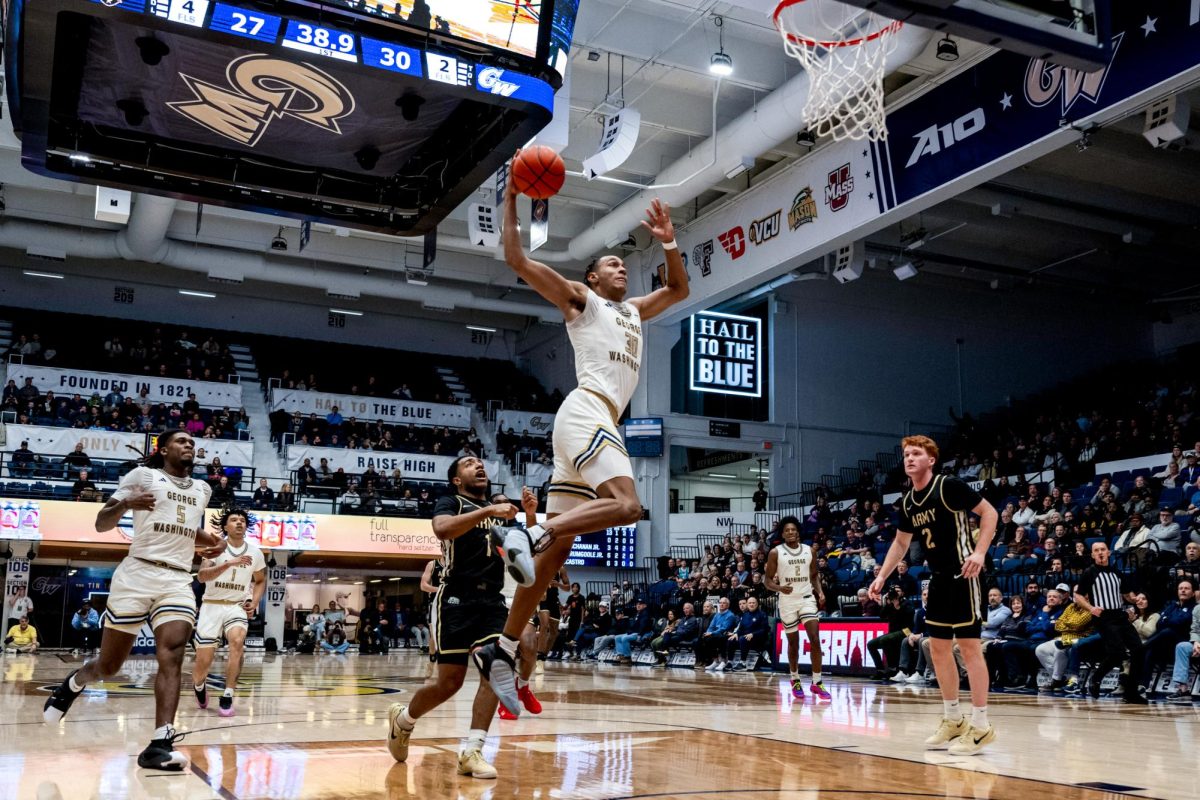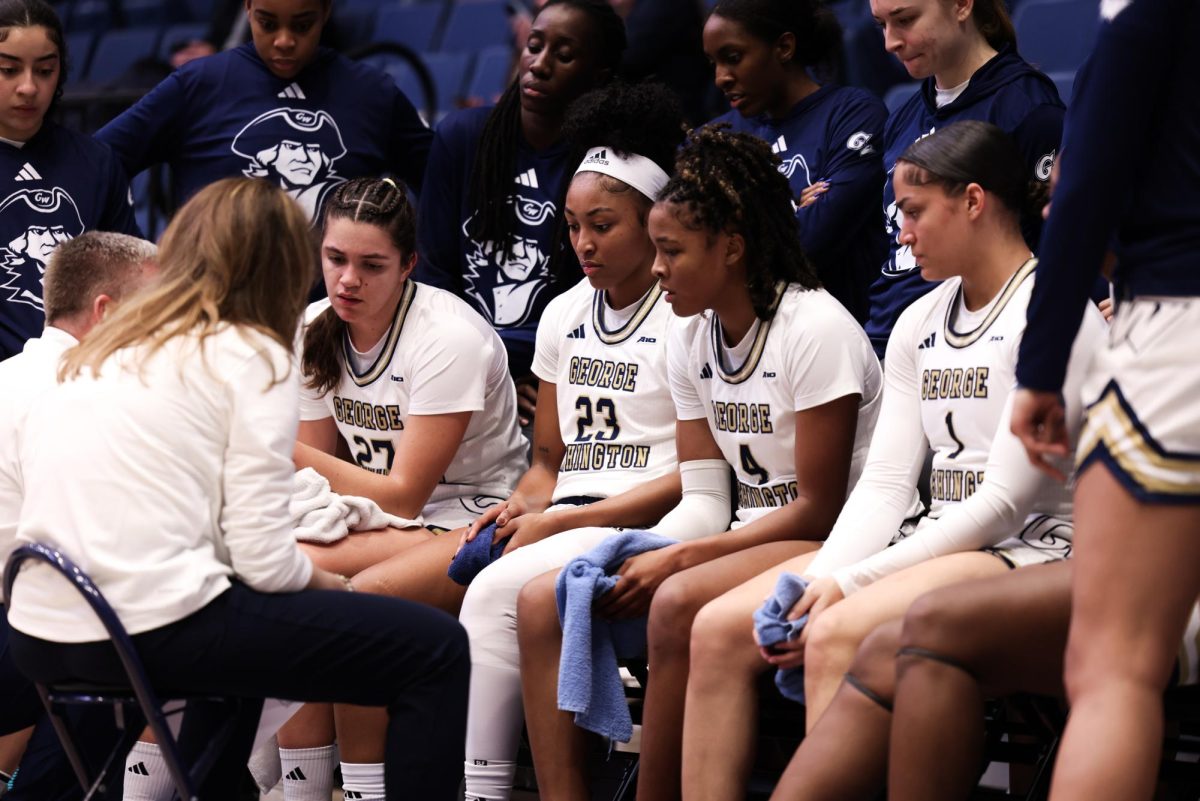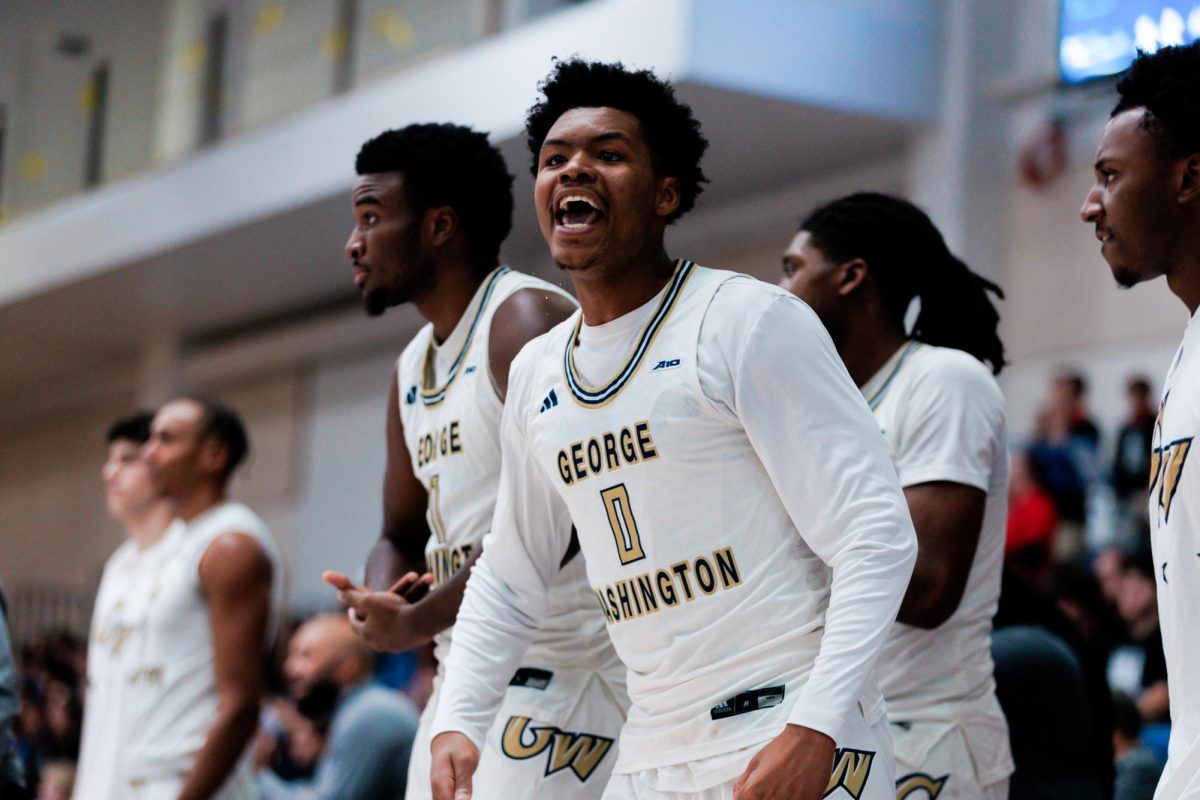Sixteen months ago, Tom Penders and Austin, Texas parted ways. Yet the battle between the University of Texas and its former basketball coach has hardly waned.
Two days after their disappointing season ended in a loss to the University of Oklahoma, four University of Texas men’s basketball players came to Athletic Director DeLoss Dodds’ house on March 8, 1998, and expressed their frustration with the program. At this meeting, which Penders did not hear about until days later, guard Luke Axtell said he was inclined to transfer.
Axtell was suspended from the team March 17 for not meeting academic standards, an unusual off-season move. A day later, Axtell’s mid-semester grade report was faxed to KVET, an Austin radio station that also broadcasts UT athletic events. His grades were read on the air while Coach Tom Penders was on vacation in the Caribbean. Penders’ contract was bought out April 2, and his coaching career appeared all but over.
Three months after the grades were released, GW Athletic Director Jack Kvancz lured Penders away from the lucrative television world and back onto the hardwood.
Penders became GW’s 23rd head basketball coach June 18. And it was as the Colonials’ top man that Penders spoke Friday from Rhode Island to talk about the depositions that were filed earlier this month in a defamation of character lawsuit Luke Axtell has brought against Capstar, the parent company of KVET.
“Jack knows the truth,” Penders said. “He’s studied everything, I don’t break rules.”
Axtell, who transferred to the University of Kansas, has made allegations to the contrary, and although Penders is not named in the $50,000 suit, the depositions are mainly focused on him and his role in the affair.
At the time of Penders’ buyout (for $900,000, says Penders; Dodds disputed that sum to The Washington Post), the general understanding was the grades were released by Penders’ assistant Eddie Oran, since Oran took responsibility in a statement made after the grades were released.
Now, Oran’s deposition said Penders ordered him to fax the grades to the radio station, and he was merely protecting Leslie Parks, a pregnant UT secretary who carried out the deed.
Parks stated in her deposition she believed the fax was meant to justify Penders’ suspension of Axtell, but Texas has since stated Axtell was never actually ineligible and should not have been suspended for academic reasons.
In addition, both Oran and radio personality William Schoening claim to have spoken to Penders on the phone while he was in the Caribbean. In fact, Schoening’s deposition said he was speaking to Penders when the fax was handed to him.
Penders says this is impossible. In addition, to his denial that he had any part in the faxing of the grade report, he asserts any phone calls are an impossibility.
“Phone records show when I was in the Caribbean, I didn’t make one phone call,” Penders said.
In relation to telling Oran to fax the grades, Penders told The Washington Post, “If somebody said I told them to do something, it plain and simple didn’t happen. I would be glad to take a polygraph on that or anything else.”
Outside of the potentially legal ramifications of these depositions (although, as stated, Penders is not named and neither is the university – it would take state approval to sue UT, said a UT spokesman), there are accusations aimed at Penders which appear to serve little legal purpose in Axtell’s lawsuit.
Many of the deposed witnesses were asked about an alcohol problem Penders was rumored to have had, although Penders says such rumors were all started by Dodds, who Penders says wanted a new coach for some time.
“I don’t even drink,” said Penders, who vehemently denies all the charges.
One player, Brandy Perryman, whose deposition focuses greatly on Penders’ character, said in his deposition that Penders had a sports psychologist speak to the team incessantly, and that Penders verbally abused him, calling him late at night and telling him how poorly he played.
“You can ask Shawnta (Rogers) and Mike (King),” said Penders. “I call players after games. After I watch tape. What I told Perryman was to get his head out of his ass and be a leader, because he was shooting 27 percent.”
Penders says this is all business as usual at UT, where Penders claims Dodds gets whatever he wants. Penders said Dodds wanted a new coach, and he spent two years telling boosters about Penders’ alleged alcohol and verbal abuse, and intimating that Penders’ heart trouble (which led him to have a defibrillator and pacemaker placed in his chest) should preclude him from coaching.
Through a spokesman, Dodds declined to comment on any of Penders’ statements.
Penders also said not only was no one on his side deposed, but all the depositions come from people beholden to Dodds and UT athletics, including Schoening, whose radio station broadcasts UT sports, and Oran, who Penders says now sells cars for a big UT booster.
Unless Penders is ever named himself, the issue at hand is merely his good name, since his part in the grades release is fairly irrelevant to the defamation of character lawsuit against KVET.
“It’s a spin thing,” said Penders. “That’s all this is. Nothing has really changed. They were trying to smear my name, and the only way was this lawsuit. I was never deposed. I’m one of the most laid back coaches in the country. I’ve been doing ESPN work for 15 years because of my sense of humor – not because I’m an ogre.”
And although, according to the Austin American-Statesman, Penders and UT agreed to not sue each other in April 1998, Penders has not ruled out a lawsuit of his own.
“I would love for them to say something my lawyer could go after,” Penders said.
But most importantly to followers of the Colonials program, Athletic Director Jack Kvancz is a firm believer in his friend Tom Penders.
“I researched it the best I could before we hired Tom and I found nothing,” Kvancz told The Washington Post. “When Texas bought him out, it was a pretty good sign to me that everything was kosher.”
Basketball Notes:
* As reported last year, Luke Axtell said in the University of Kansas basketball media guide that the one team he wants to play the most is GW. After hearing that, Penders called Kansas coach Roy Williams and inquired about a home-and-home, but Williams declined.
* The rumors of J.J. Brade returning to the Colonials team he played for from 1995-1998 appear to be just that. Brade had reportedly enrolled at GW last spring and was a fixture in the weight room and at games, but Penders reports he is not even sure if Brade is still enrolled at GW.
“I told him if you get your act together and your grades up, just like anyone else at GW who wants to try to be on the team, I’d welcome him, but I haven’t seen him in months,” Penders said. “I don’t know what his status is.”
* Jamal Brown, the former Baltimore Player of the Year who had reportedly signed with GW in May, was noticeably absent from the basketball team’s summer prospectus. Coach Penders reports that Brown did sign a national letter of intent with GW, but he had some trouble qualifying to enroll. Brown indicated in May to The Insider’s Report that he would sit out in the fall if he failed to qualify, but Penders says he has told the 6-6, 212-pound power forward that he will not stand in his way if Brown chooses to go elsewhere.
“We told him he’s free to go elsewhere if he wants,” Penders said. “He has a lot of options.”
* In other roster moves, highly touted signees Chris Monroe and Val Brown have apparently both qualified, as has junior-college point guard Bernard Barrow. And as previously reported, guard Andry Sola has transferred to Drake University in Iowa, where he will have to sit out a season.
“He just told me he didn’t think he could play with the guys we were bringing in,” Penders said of Sola’s departure. “It kind of surprised me. He said he wanted to be a starter and play somewhere where he could be a star. So he’s at Drake. I wasn’t sure if that was a university or a restaurant. But he’s a great kid and he certainly h
as my blessing. This opens up a position for Valery Khamenia.”
Meanwhile, guard Roey Eyal returned to Israel.
A previously unreported addition to the team is walk-on Arthur Andrews. Andrews is a 6-6 forward from Avon, Connecticut who averaged 17 points and eight rebounds as a high school senior. Andrews practiced with the team last season and spent the season in street clothes on the bench. Without J.J. Brade and Jamal Brown, that leaves four newcomers, three players lost to graduation, and two players who left the program. That does not include sophomore forward Jason Smith, who will be returning to play this year after missing most of his freshman year after suffering a lower abdominal hernia.
*On the women’s side, three recruits have been added this year: Cathy Joens, Erica Lawrence, and third-team Parade All-American Lindsey Davidson, a guard from Brea, CA.
* The field for the 2000 BB&T Classic will be a blockbuster. Joining GW and Maryland will be the University of Michigan and St. John’s University, Mike DeCourcy of The Sporting News reported in July. St. John’s is, of course, the home of former GW coach Mike Jarvis.






